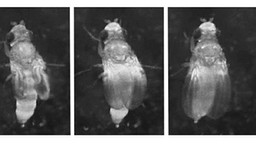Project B2 Wegener
Timing of peptide-orchestrated eclosion behaviour in the fruit fly Drosophila
Summary
Fruit flies (Drosophila melanogaster) eclose during the early morning hours, which represents a classic example for a circadian behaviour. Fruit fly eclosion is also a classic example of how (neuro)peptide cascades coordinate physiology and behaviour. It is, however, unclear how the circadian clock interacts with the peptidergic signalling pathways coordinating eclosion behaviour. Since eclosion represents a developmental transition, it also underlies developmental timing by ecdysteroids.
The aim of this project is to identify the signalling connections between the central clock and the peptidergic networks regulating eclosion behaviour on a cellular level. We ask how and when central clock neurons in the fruit fly brain interact with peptidergic signalling cascades in order to time eclosion, and deploy neuroge-netics, imaging and behavioural monitoring to functionally dissect underlying synaptic, paracrine and hormonal connections. We also are investigating the role of different photoreceptors in light entrainment and photoresponse of eclosion behaviour, and are testing the behavioural relevance of the circadian clock under (semi)natural conditions.
With the genetic tools available for the fruit fly, the circadian control of eclosion appears as a well-suited paradigm to investigate the cellular and molecular mechanisms behind clock-controlled secretory activity of peptidergic neurons.






